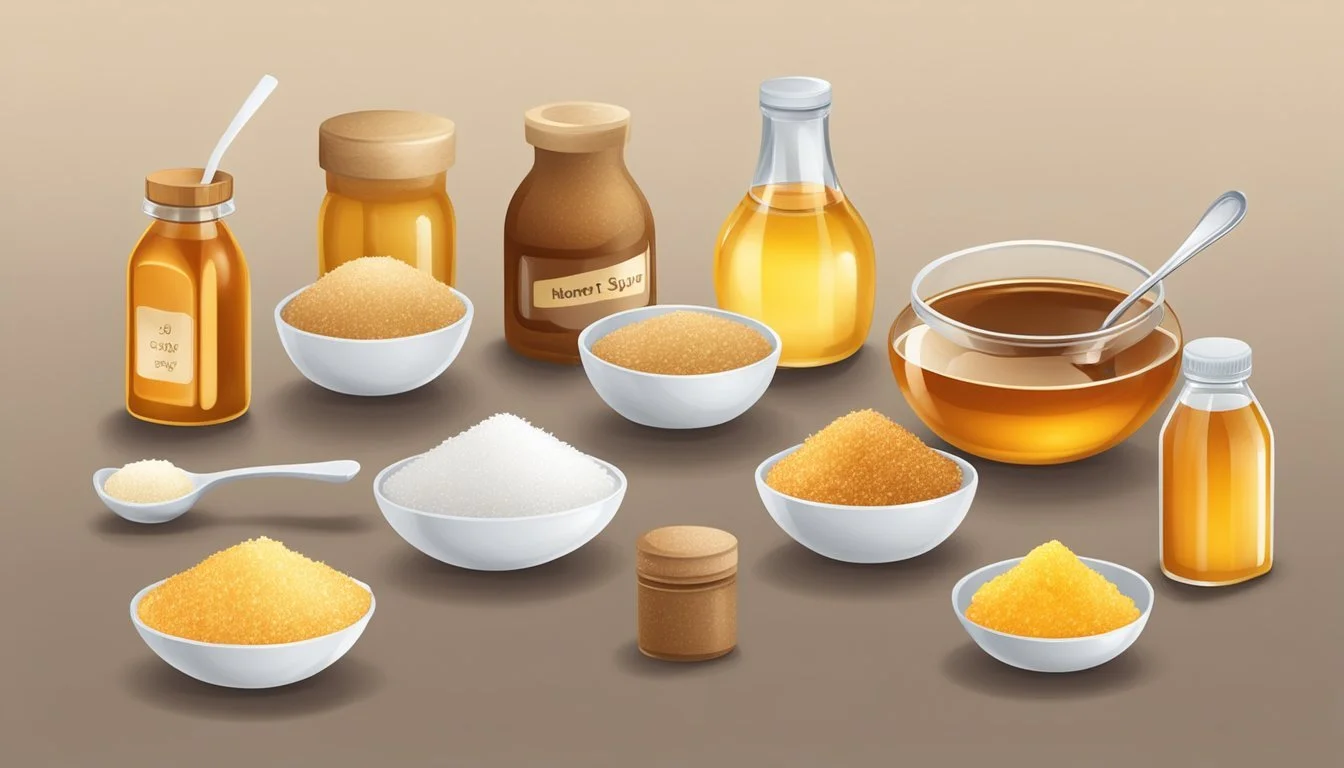Turbinado Sugar Substitutes
Top Alternatives for Your Recipes
Turbinado sugar, known for its golden-brown color and mild caramel flavor, is a popular choice for those seeking a natural sweetener with a bit of texture. While it's a great option for many recipes, there are times when you might need a suitable substitute. Common replacements for turbinado sugar include brown sugar, demerara sugar, and muscovado sugar, each offering a distinct flavor profile and texture.
For those looking for a more liquid alternative, honey or dark corn syrup can also be effective substitutes, adding a different kind of sweetness and moisture to baked goods. Additionally, maple sugar and coconut sugar serve as more natural options, providing unique tastes and potential health benefits. With such a variety of substitutes, you can easily find one that fits your culinary needs.
Understanding Turbinado Sugar
Turbinado sugar, known for its large crystals and molasses flavor, comes from minimally processed sugar cane. This unrefined sugar retains its natural molasses, giving it a distinctive taste and moist texture.
Origin and Production
Turbinado sugar is derived from sugar cane, a tall grass native to tropical regions. After harvesting, sugar cane is crushed to extract the juice. This juice is then boiled, evaporated, and spun in a turbine or centrifuge. The centrifuge process removes most of the liquid molasses but leaves behind a light coating, resulting in the sugar's characteristic color and flavor.
The term "turbinado" comes from the Spanish word "turbina," referring to the turbine used in its production. Unlike refined white sugar, turbinado sugar undergoes minimal processing. This keeps some molasses intact, maintaining its natural caramel-like taste.
Characteristics of Turbinado Sugar
Turbinado sugar features large, coarse crystals and a light brown color. These crystals have a moist texture due to the presence of natural molasses. This unrefined sugar is known for its distinctive molasses flavor, which adds richness and depth to baked goods and beverages.
The molasses content gives turbinado sugar a subtle caramel flavor. It's less processed than granulated white sugar, preserving some of the nutritional elements found in raw sugar. Turbinado sugar is often used in recipes where a more intricate flavor profile is desired, such as in baking or as a topping for oatmeal and yogurt.
Culinary Uses
Turbinado sugar substitutes can enhance a variety of dishes. Ideal for both cooking and baking, these alternatives bring unique textures and flavors to recipes, from everyday pancakes to more intricate baked goods. They also serve well as sweeteners in beverages, adding nuanced tastes.
Cooking and Baking Applications
Brown Sugar – This popular substitute combines white sugar with molasses, giving it a moist texture and rich flavor. Perfect for adding depth to cookies, cakes, and muffins.
Honey – With its natural sweetness and thick consistency, honey works wonders in granola, marinades, and glazes. It caramelizes wonderfully, making it an excellent choice for roasted vegetables and meat dishes.
Maple Syrup – Ideal for pancakes and waffles, it also integrates smoothly into sauces, dressings, and baked goods. Adjust the recipe slightly to balance the liquid content.
Caster Sugar – Known for its fine texture, it’s excellent in delicate pastries and desserts like meringues. It dissolves quickly, ensuring an even sweetness in cakes and cookies.
Coconut Sugar – This unrefined sugar adds a subtle caramel flavor, suitable for brownies, banana bread, and other dense baked goods. Consider it for recipes where a less processed sweetener is preferred.
Beverage Sweetener
Honey – Providing a naturally sweet flavor, honey is a go-to for teas, coffee, and smoothies. It blends easily and adds a slight floral note to beverages.
Maple Syrup – This liquid sweetener imparts a unique, robust flavor to lattes, mixed drinks, and shakes. It mixes well with both hot and cold beverages.
Granulated Sugar – For those looking for a classic option, granulated sugar is perfect for sweetening iced tea, lemonades, and cocktails. It dissolves relatively well with some stirring.
Dark Corn Syrup – Often used in cocktails and sodas for a thicker consistency. It adds a rich sweetness without overpowering other flavors.
Demerara Sugar – Best used in drinks where the crunchy texture can be an advantage, like in certain cocktail recipes. It provides a hint of molasses flavor and a satisfying crunch if not fully dissolved.
Common Substitutes for Turbinado Sugar
Turbinado sugar can be replaced in various recipes by considering substitutes based on texture, flavor, and health benefits. Additionally, lighter alternatives and liquid sweeteners offer versatile options for achieving similar results.
Substitutes Based on Texture
Demerara Sugar: This raw cane sugar has large crystals like turbinado sugar, making it a suitable substitute. It provides a similar crunch and can be used in the same amounts.
Muscovado Sugar: With its larger, moist crystals, muscovado sugar can mimic the textural properties of turbinado sugar while also adding a rich, complex flavor.
Sanding Sugar: Known for its large, sparkling crystals, sanding sugar can replace turbinado sugar in decorative applications such as topping baked goods.
Substitutes Based on Flavor
Brown Sugar: Made by adding molasses back to white sugar, brown sugar imparts a similar caramel flavor. It comes in light and dark varieties, with dark brown sugar having a more robust flavor closer to turbinado sugar.
Coconut Sugar: This natural sugar has a subtle caramel flavor and works well in recipes where the turbinado sugar’s flavor is significant.
Maple Sugar: Derived from maple syrup, maple sugar provides a distinct maple flavor and can replace turbinado sugar while offering a unique taste.
Substitutes Based on Health Benefits
Honey: Rich in antioxidants and nutrients, honey offers a natural sweetness that can replace turbinado sugar. It has a lower glycemic index, making it a healthier option.
Coconut Sugar: Not only does it have a caramel flavor, but it also contains more minerals like calcium and potassium compared to regular sugar. Its lower glycemic index is another health benefit.
Maple Syrup: As a liquid sweetener, maple syrup is packed with antioxidants and has a lower glycemic index. It’s a healthier alternative with a unique taste profile.
Lighter Substitutes
Light Brown Sugar: This type of sugar contains less molasses than dark brown sugar, resulting in a lighter color and milder flavor. It can be used in recipes requiring a subtler flavor.
White Sugar: Granulated sugar can substitute turbinado sugar if a recipe requires sweetness without the added flavor of molasses. It’s a common ingredient and readily available.
Caster Sugar: Also known as superfine sugar, caster sugar dissolves quickly, making it ideal for baking and delicate desserts where smoothness is key.
Liquid Sweetener Substitutes
Honey: Versatile and rich in nutrients, honey can be used to replace turbinado sugar in both cooking and baking. Its liquid form may require adjustments to the recipe’s liquid content.
Maple Syrup: This liquid sweetener can substitute turbinado sugar, especially in recipes where a rich, deep flavor is desired. It’s ideal for sauces and dressings.
Dark Corn Syrup: Similar in texture to honey, dark corn syrup can replace turbinado sugar. It adds a sweet, slightly molasses-like flavor and works well in baking recipes.
These substitutes offer varied options depending on the desired texture, flavor, or health benefit, making it simple to replace turbinado sugar in any recipe.
Complementary Ingredients in Recipes
When substituting turbinado sugar, selecting the right complementary ingredients is crucial to maintain the desired flavor and texture of dishes. Flour, sugar alternatives, and fine consistency are key considerations.
Interchangeability in Recipes
Many sugar alternatives can be used interchangeably with turbinado sugar. Brown sugar and honey are popular replacements due to their similar sweetness profiles. Brown sugar can be especially helpful when a robust flavor is needed.
Honey, although liquid, is versatile and adds moisture to baked goods. For baking purposes, sugars with fine consistency, such as caster sugar, work well for a smoother texture in cakes and cookies. Availability of these alternatives means they can be easily sourced from local stores or online markets, ensuring recipe flexibility.
How to Substitute Turbinado Sugar
When substituting turbinado sugar, it’s important to consider the texture, flavor, and moisture content of the alternative sweetener. Adjustments to recipe measurements might be required to maintain balance.
Substitution Ratios and Measurements
Brown Sugar: Use a 1:1 ratio for turbinado sugar. Brown sugar has a similar molasses content and provides a comparable texture.
Honey: Replace 1 cup of turbinado sugar with 3/4 cup of honey. Reduce other liquids in the recipe by 1/4 cup. Honey is sweet and adds moisture.
Caster Sugar: Use equal amounts, but note it dissolves quicker. Ideal for baking where a fine texture is needed.
Demerara Sugar: Similar in texture, use a 1:1 ratio. It adds a subtle caramel flavor.
Palm Sugar: Use as an equal substitute but be mindful of its firmer texture. Often used in Southeast Asian recipes.
Maple Syrup: Substitute 1 cup turbinado with 3/4 cup maple syrup and reduce other liquids by 1/4 cup. Maple syrup imparts a distinct flavor.
Sanding Sugar: Generally, this is used for decoration. Its coarse texture might not always be suitable for mixing into doughs or batters directly.
Factors to Consider When Substituting Turbinado Sugar
When replacing turbinado sugar, one must evaluate how substitutions will affect the sweetness, flavor, moisture, and texture of the final product. Each substitute brings different qualities, which can impact the overall outcome of recipes. This section helps to understand these critical factors.
Impact on Sweetness and Flavor
The sweetness and flavor profile of turbinado sugar, with its caramel undertones, can be matched by several substitutes. Honey offers a similar level of sweetness and adds a unique floral flavor, while dark corn syrup has a subtle sweetness and a mild, rounded flavor.
Brown sugar, containing molasses, enhances the flavor by adding a deeper, more complex sweetness. Demerara sugar, resembling turbinado sugar, provides a comparable caramel-like flavor but is slightly less refined. Maple syrup also serves as a natural sweetener with a distinct maple flavor.
Choosing the right substitute depends on the desired flavor profile. Liquid substitutes like honey and maple syrup can introduce new flavors, whereas dry substitutes like brown sugar and demerara keep closer to the original taste.
Moisture and Texture Modification
Turbinado sugar's coarse texture and low moisture content impact the texture and moisture of baked goods. Honey and maple syrup, both liquid substitutes, add moisture and can result in a moist, sticky texture. This makes them suitable for recipes needing extra softness, though adjustments to other liquid ingredients may be necessary.
Using brown sugar can also increase moisture due to its molasses content. This helps create a slightly moist texture in cakes and cookies, contrasting with the dry, coarse feel of turbinado sugar.
In contrast, caster sugar and homemade powdered sugar blend easily into doughs and batters, maintaining a dry texture. Muscovado sugar, rich in molasses, can also be a good choice for recipes requiring a moist texture. Adjustments may be necessary to balance overall moisture content.
Processing and Sustainability Considerations
Processing turbinado sugar involves minimal refining compared to white granulated sugar, maintaining some natural molasses. The sustainability of sugar substitutes varies based on production methods and the impact on the environment.
Environmental Impact of Sugar Production
Sugar cane cultivation typically requires significant water resources and can lead to deforestation. The growth of sugar cane also involves the use of fertilizers and pesticides, which can harm local ecosystems. Moreover, the processing of sugar cane to produce refined sugars consumes large amounts of energy and can result in substantial greenhouse gas emissions.
Efforts to mitigate these impacts focus on sustainable farming practices. These include water conservation, reduced pesticide usage, and crop rotation. Employing sustainable practices not only helps preserve natural resources but also supports the ecological balance of the surrounding areas.
Sustainability of Sugar Substitutes
Natural sugar substitutes like xylitol and erythritol are produced using more sustainable methods compared to traditional sugar. The bioproduction of these substitutes often involves engineered microbial cell factories, which can utilize cheap substrates and reduce environmental burdens. This process can significantly lower the carbon footprint associated with sugar substitute production.
Moreover, these substitutes typically have lower caloric content and can contribute to reducing overall sugar consumption. This reduction can benefit public health by decreasing the risks associated with high sugar intake, such as diabetes and obesity. Sustainable bioproduction methods ensure the provision of natural sweetness with minimal environmental impact, aligning with the growing consumer demand for healthier and more eco-friendly products.






